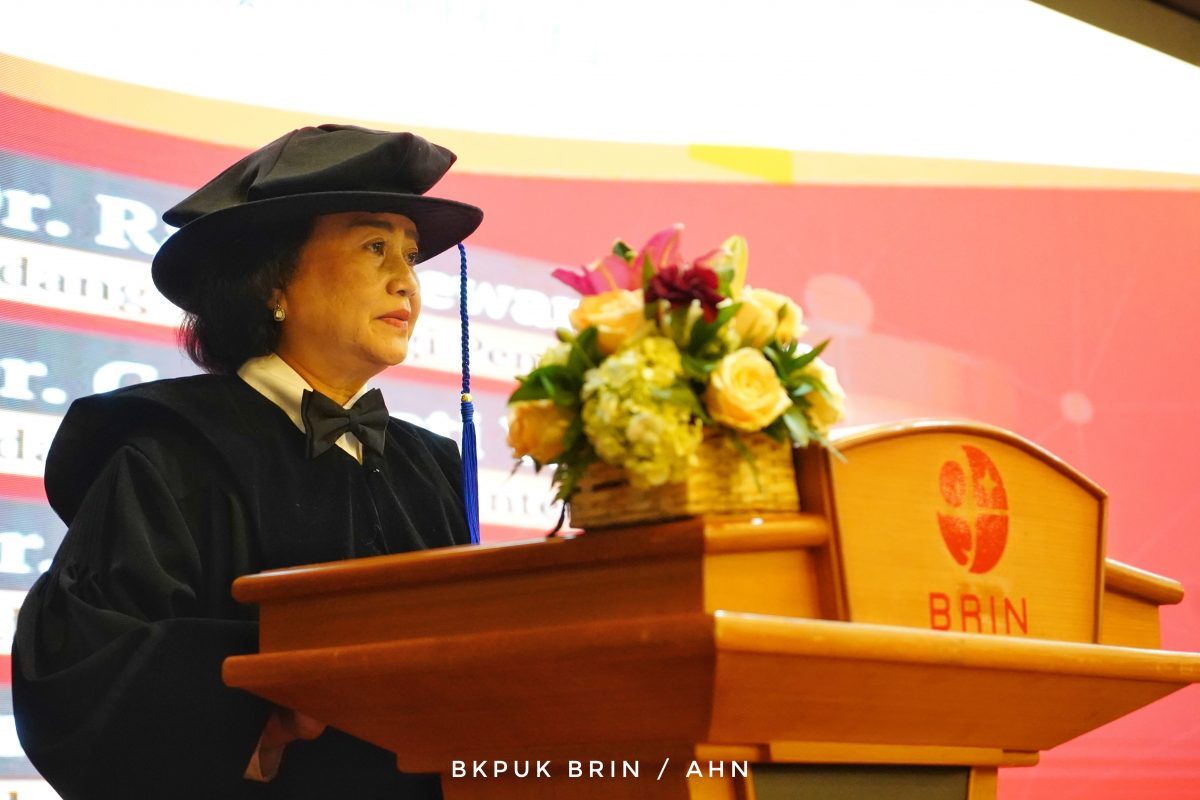Jakarta – BRIN Public Relations. Indonesia’s foreign policy always has dynamics of change due to influence from domestic and international environments. Indonesia has consistently confirmed its status and role of foreign policy as a middle power country in regional and global arenas.
Researcher in the field of International Relations at the National Research and Innovation Agency (BRIN), Ganewati Wuryandari, said that Indonesia’s foreign policy activism as a medium-sized country is greatly influenced by improvement in its material capabilities and ideational resources. The rise of Indonesia’s foreign policy as a medium-sized country can be seen in two ways, namely in terms of promoting democracy, human rights, and archipelagic state notion, and when it responds to changes in the regional strategic environment.
During the era of President Susilo Bambang Yudhoyono (SBY), the country’s economic and political conditions had positive developments. It was the world’s third largest democracy and a Muslim-majority country who were active in the introduction of democracy. The foreign policy was run under the approach of all-directions foreign policy, a million friends, and zero enemies. When President Jokowi replaced SBY in 2014, Indonesia’s foreign policy has a different vision of international politics. The foreign policy of free and active is interpreted with a more pragmatic approach, and there is a paradigmatic change with identity as an archipelagic country.
“Despite differences in foreign policy orientation, Jokowi and SBY share the same view of Indonesia as a middle power country and seek to build medium power diplomacy. This role is increasingly important, especially in the midst of uncertainty of the global security and economic situation,” explained Ganewati in her academic oration in her Inauguration as Research Professor, Thursday (10/3).
Furthermore, Ganewati explained, there are two factors that have pushed the activism of Indonesia’s foreign policy as a middle power since the SBY’s administration to Jokowi’s. First, strengthening of material ownership. Based on its material capabilities, Indonesia has great potential as it is the largest archipelagic country in the world, located at the crossroads of two oceans and two continents, and has the largest Muslim population in the world and is a model where democracy and Islam can go hand in hand.
The second factor is strengthening of international identity and role. In the reform era, Indonesia entered a new era of the democratic system. The values of democracy and human rights are important aspects of foreign policy. The identity of this role was expanded during the SBY when Indonesia was labelled as a Muslim democracy, norms setter, consensus builder, peace maker, bridge builder, and voice of developing world. Jokowi’s foreign policy is also directed at the role of peacemaker and bridge builder and fulfilment of the national interests as the world’s maritime axis.
SBY and Jokowi place the issues of democracy, Islam, and human rights as part of their foreign policy and improve the country’s role through participation in various global governance issues and multilateral forums. In addition to democracy, human rights and Islam, Jokowi administration brings a novelty in Indonesia’s foreign policy with an identity as the “World Maritime Axis”. There are four main focuses that can be seen from the implementation of Indonesia’s foreign policy.
First, Indonesia focuses on revitalizing its national strength in two fields, namely economy and security. In the economic field, Indonesia strengthens economic diplomacy towards policy with added value, and expands markets to non-traditional markets in Africa, South Asia and Latin America. In the security sector, increasing military capability is a concern and priority for the Indonesian government. The second focus is to build regional/global codes of conduct and institutions. Since the formation of ASEAN, Indonesia has been in a position that Southeast Asia must become a safe and peaceful region. Indonesia also continues to ensure ASEAN centrality in the development of regional architecture in the Indo-Pacific.
The third focus is building bilateral relations with key countries in the Region in the form of Strategic and Comprehensive Partnerships. In this case, Indonesia has 23 CEPA/PTA/FTA/Economic Agreements and some are still in the negotiation process. The fourth focus is to build cooperation among middle powers. Limited capacity encourages network diplomacy among medium-sized countries, one of which is Indonesia’s involvement in MIKTA (Mexico, South Korea, Turkey, and Australia).
Indonesia’ss existence as a middle power is inevitably important in responding to and influencing the international order having role and functions as facilitator, mediator, bridge-builder, and good international citizen, particularly as a normative middle power that is relatively successful in advancing regional and global norms.
In addition to the normative strategy that it has successfully played as a middle power, Indonesia also needs to improve its material resources so that it can carry out its functional strategy, and strengthen its identity without looking at short-term interests. Stakeholder involvement is also needed so that there is stronger legitimacy to support the implementation of foreign policy in the future.
“Although there are certain behaviors that are the characteristic of middle power countries, the behaviors of middle power countries can be different. There is a social contextual dimension with the domestic and international nexus that influence it. For this reason, further studies on the foreign policy of middle power countries are needed in the future. This includes further studies on the foreign policy of middle power such as Indonesia with its identity as an archipelagic country,” concluded Ganewati. (aps)

